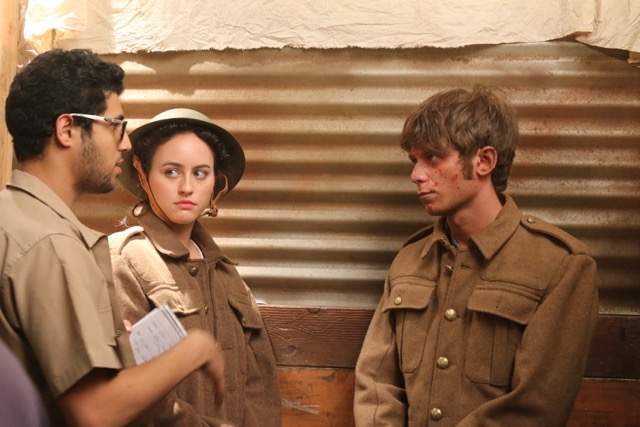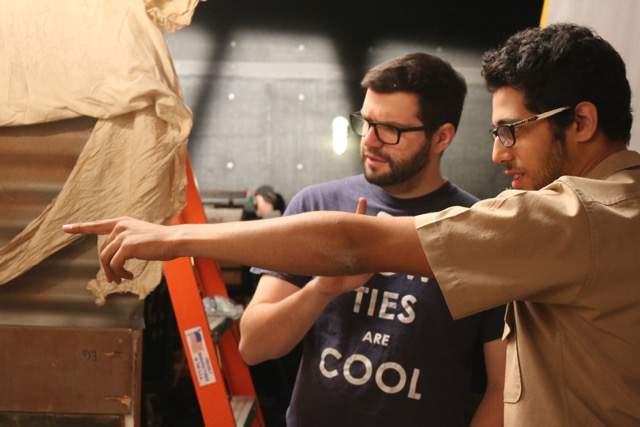Arguing about the reason for existence or metaphysical superiority is something which Youssef Gouda has no interest in, he’d rather explore the dark places where humor also lurks. There’s much about the world that is unjust and difficult; in choosing to navigate these scenarios with comedy, Youssef makes them palpable, even if only to later leave his audience to contemplate the possible truth of it all. In writing the film Doris, Mr.
Gouda declares, “I wanted to make something ambitious for a ridiculously small amount of money. I wanted to challenge myself to tell a dark, twisted comedy that took notes from Waiting for Godot and Monty Python.” This statement not only reveals Youssef’s influences but reinforces that in the modern day, it is writing which is where the true DNA of unique filmmaking lies. Wondrous visuals are easily manifested with software skill and marquee names can be found on the small screen as often as the big screen but the storyteller who envisions original concepts, dialogue, or both, is what will continue to drive the industry to its future form.

The complexities of the human mind are vast. It is both a tool for reasoning and a coping mechanism for when reality is overwhelming. With Doris, Youssef has highlighted how two individuals who seem similar can choose disparate interpretations of the same situation when their minds are grasping for an escape.
The writer relates, “I think there’s a real honesty about the mental gymnastics we do in our own head to ignore the truth staring right at our face. I wanted to make Doris because I wanted to take a ridiculous plot and treat it seriously.” This idea of interpreting the truth is as relevant today as today as it was in any part of history but what Youssef has done so masterfully in this film is to give us a vantage point that illuminates the choice of it all.
The humorous tones are certainly dark but in an almost slapstick manner which allows the audience to recognize bits of themselves and their own hyperbolic reactions to events when under stress. Don’t misunderstand, there’s no point which Mr. Gouda is trying to preach, it’s simply human ridiculousness that’s on display. Granted, this behavior is understandable considering the dire scenario in which the two main characters find themselves but the story still begs the question, “what path do you choose when times are overwhelming?”
Doris stars Harry Boxley (of NBC’s Primetime Emmy Nominated Comedy Series Parks and Recreation, ABC’s People’s Choice Award Nominee The Goldbergs) as Perry, Daniel Mardapittas as Chuck, and Eva-Colette Smith as Doris. Perry and Chuck are the final two survivors of their battalion. In a trench, they struggle to hold onto the hope that their British Army comrades will return for them.
When a bomb lands in their trench but does not detonate, the unfathomable tension nudges the two men towards different realities. The bomb, aka Doris, is the expectorant that produces personality shifts which have mortal results for these men but not in the obvious way. The sobering environment of Doris is what makes the absurdist comedy of its characters so delightfully palpable.

Youssef Gouda not only wrote Doris but also served as director to carry his vision to fruition. He confesses, “Tonally the script was really hard to pin down. I must’ve written fifteen different drafts of the script. I think the challenge was I felt I could tell fifty stories with those characters and that setting but only one of those stories was the right one. It’s like being crippled by choice. The reality was that I didn’t trust myself enough, and that’s common when you start to write, you’re constantly questioning if you’re going on the wrong path or not.
The Opening Scene was always in my mind from the start. It was of Perry and Chuck sitting looking over their trench and just being bored out of their minds. With the war happening in the background. It’s an evocative image and tonally it sets everything in place. Especially with Perry’s first line ‘Do you want to hear a joke?’ Filming it was just downright terrifying. It’s the one shot that Emily [Meyers, DP] and I couldn’t test since every plan we had for it fell through. I went into the day having no idea how it would look and that is every director’s worst nightmare.
You’re essentially put in an impossible position because if it looks terrible there’s almost nothing you can do about it.” The power of Doris reveals none of these concerns or self-consciousness. The story simultaneously wields gravitas and comedy, a difficult feat for any filmmaker. Youssef’s investment in the characters is what cultivates this pleasing blend as he communicates, “I’ve seen filmmakers complain about budgets and moan about how they can’t afford the latest Arri camera but none of that really matters. Having a big budget is great, but budgets don’t make a movie. The story does.
The characters. The performances. Stuff that doesn’t cost an arm and a leg. No one really talks about how films today are overproduced. Even the new Star Wars films are so hell-bent on being big and large in scope that the story gets lost. The original Star Wars was made very cheaply (by today’s standards at the time it was a very big budget) but it worked because it was focused on telling one story.”
Writer – Arlen Gann